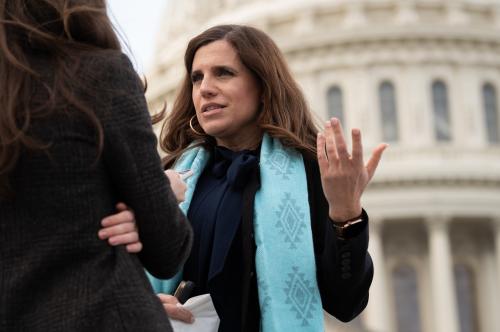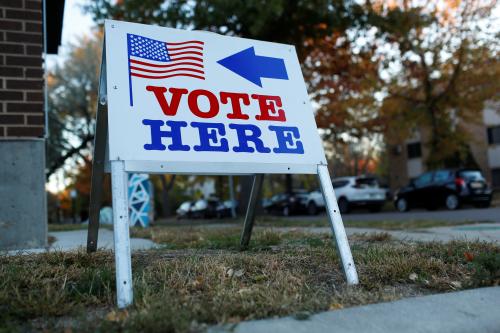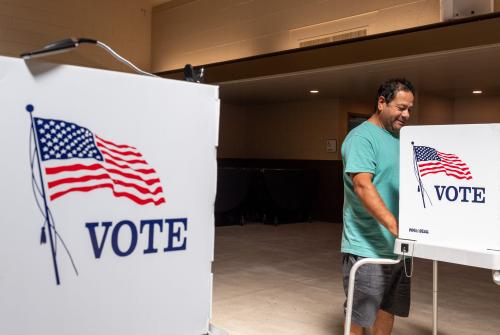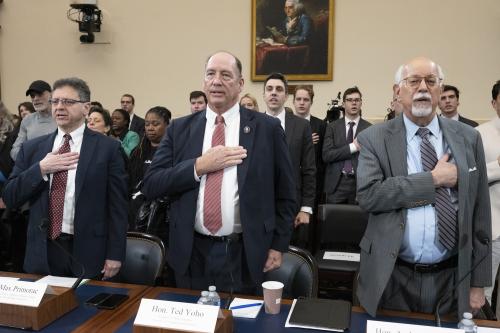Mike Pence seems to be using a strategy that tiptoes around his relationship with Donald Trump. He was, as would be expected, a loyal vice president. And yet in the final days he broke from his president when Trump pressured him to, single handedly and without any legal basis, reject the electoral college votes from states Trump had lost. In upholding the Constitution, Pence got a modicum of respect from Democrats and others who had seen him merely as a lapdog to Donald Trump. This year, by endorsing and campaigning for Georgia Gov. Brian Kemp and Secretary of State Brad Raffensperger, two incumbents who also resisted Trump’s attempts at undermining the election, Pence once more placed himself on the side of the Constitution and the law.
And yet, while Pence has clearly differentiated himself from Trump’s attempted coup, he has refrained from engaging in a full-throated critique of Trump. Unlike Rep. Liz Cheney, Pence has not called the former President “clearly unfit for office.”
While on the stump for Republican candidates, he emphasizes the accomplishments of the Trump/Pence Administration. In addition to campaigning for individual candidates, Pence has spoken at pro-life events, at donor retreats and at fundraisers for Republican candidates. In short, he is doing everything he can to ingratiate himself with the Republican party.
Some say that Pence’s wishy-washy positioning vis a vis his former boss won’t work. But there’s evidence that it will.
The first piece of evidence came in the fall of 2021 when Republican Glenn Youngkin won the Governor’s race in Virginia. There, Youngkin skillfully kept Trump at arm’s length. Trump never came to the state, and on the eve of the election, he conducted a private tele-rally that was closed to the press and did not get much attention. The result? Youngkin outperformed Trump in the northern Virginia suburbs that count for such a large portion of the Virginia vote.
While it’s true that there are parts of the country where Republicans seem to be trying to outdo each other to see who can be most like Trump, wishy-washy may be just what the doctor ordered in all but these most deeply Republican places. Youngkin had to cut into the more liberal northern Virginia vote in order to win the state. In last week’s primaries, incumbent Nancy Mace, (who, like Pence was a big Trump supporter until she broke with him over January 6) ran a campaign that was careful to not go too hard on Trump and she won her primary against a Trump endorsed challenger.
The June 21 primaries resulted in more wins for the wishy-washy candidates. Georgia has not been a good state for Trump this year. In addition to his big losses in the Governor’s race and in the Secretary of State’s race, Trump endorsed candidates lost two congressional runoffs, Jake Evans (GA-6) and Vernon Jones (GA-10.). The winners in these races were not liberal by any means. Rich McCormick, the winner in Georgia’s 6th district primary, who is a veteran with conservative views on most issues, had a conservative platform on election integrity but shied away from getting involved in the more controversial issues surrounding the 2020 election and January 6. Ditto for Mike Collins, the winner of the runoff in Georgia’s 10th district primary.
In Virginia’s second congressional district Jen Kiggans, a state senator and Navy veteran handily defeated a candidate, Jerome Bell, who was so incensed about the 2020 election that he tweeted back in September, “Audit all 50 states. Arrest all involved. Try all involved. Convict all involved. Execute all involved. #MaricopaCountyFraud.”
These winning candidates continue a trend we wrote about a few weeks ago.
Republican candidates in 2022 are enthusiastic about making elections more secure. Many have plans to increase election integrity—a set of policies that Democrats see as voter suppression. But they tend to stay away from the more controversial issues around the 2020 elections.
What do these trends mean for Mike Pence? His carefully calibrated attitude towards Trump could pay off handsomely in Republican primaries.
Trump is like a gradually deflating balloon; he’s not going away with one big event but with every Tuesday he loses a little altitude. And yet, no voters, especially his voters, like to have their noses rubbed in the fact that they supported a man who, as we are learning, cared nothing for the law or the Constitution and may have taken their money under false pretenses.
Of course, Republican primary voters who reject Trump candidates in a midterm election may not reject Trump himself in a presidential primary if he decides to run. Even so, Pence’s strategy may turn out to be the winning strategy. If it is, he will be the Joe Biden of 2024, a candidate lacking excitement and charisma but a candidate with deep roots in his party. His deep and heartfelt relationships with the evangelical base of the party are reminiscent of Biden’s deep and genuine relationship with the Democrats’ African American base. In 2020, Democrats voted for a steady hand and a known quantity in Joe Biden; in 2024, Republican candidates may do the same for Pence.
The Brookings Institution is committed to quality, independence, and impact.
We are supported by a diverse array of funders. In line with our values and policies, each Brookings publication represents the sole views of its author(s).







Commentary
Tiptoeing around Trump—will Mike Pence’s strategy work?
June 22, 2022